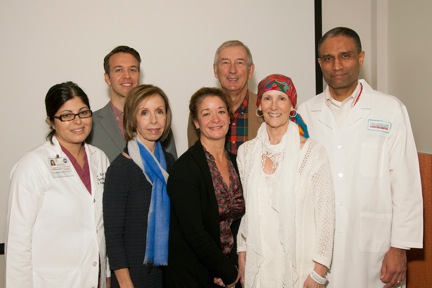
The University of Texas MD Anderson Cancer Center’s Ovarian Moon Shots
In March, the Susan Poorman Blackie Ovarian Cancer made its inaugural gift of $125,000 to The University of Texas MD Anderson Cancer Center in Houston. Funds will help support MD Anderson Cancer Center’s Ovarian Moon Shots program, evaluating genetic markers to identify the most effective therapeutic approaches for women with ovarian cancer.
According to Anil Sood, M.D., Professor of Gynecologic Oncology & Reproductive Medicine at MD Anderson, “This gift from the Susan Poorman Blackie Ovarian Cancer Foundation will provide us with incredible opportunities to aggressively move forward the work on new approaches for ovarian cancer treatment through MD Anderson’s Moon Shots Program.”
Launched in September of 2012, MD Anderson’s Moon Shots program was inspired by America’s drive generations ago to put a man on the moon. The Moon Shots Program is built upon a "disruptive paradigm" that brings together the best attributes of both academia and industry by creating cross-functional professional teams working in a goal-oriented, milestone-driven manner to convert knowledge into tests, devices, drugs and policies that can benefit patients as quickly as possible.
A portion of the gift will also be used to help fund Dr. Alpa Nick’s innovative Breath Test Bioassay research that identifies and separates compounds in the breath which might indicate the presence of ovarian cancer. This novel approach to early detection is inspiring and has far-reaching implications for various types of cancer and other tumors.
Read more about MD Anderson Cancer Center and the Moon Shots program.
Each year, approximately 20,000 women in the United States get ovarian cancer. Among women in the United States, ovarian cancer is the eighth most common cancer and the fifth leading cause of cancer death. Ovarian cancer is often called the "silent" killer because there currently is not an accurate screening test and many times there are no symptoms until the disease has progressed to an advanced stage.
Learn more about the signs and symptoms of ovarian cancer here and how the Susan Poorman Blackie Ovarian Cancer Foundation is funding these and other promising research efforts.
The Susan Poorman Blackie Ovarian Cancer Foundation’s research funding is made possible by the generous support of our donors. To contribute to life-saving ovarian cancer research, please consider making a donation.